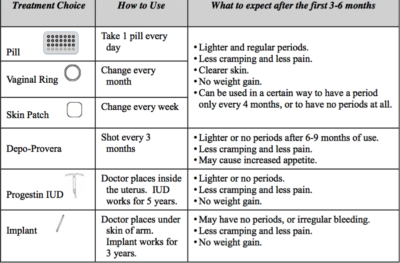Treatment for Period Problems
What treatments are available for painful, heavy or irregular periods?
Many girls and teens have problems with their menstrual periods. Sometimes periods are painful (heavy menstrual cramps), cause heavy bleeding or are very irregular, which can interfere with a girl’s normal activities like sports or school. Sometimes there is another condition (like headaches or mood swings or acne) that is made worse with monthly periods. The good news is that there are safe and effective options to manage these problems.
Hormonal therapy is a first-line, medical option for treating painful, heavy irregular, or problem periods. It is important to note that although these options are usually packaged as “birth control,” in this case they are being recommended to treat a medical condition.
Your doctor will discuss hormonal therapy treatment and answer any questions or concerns you have. Our goal is to help you find the best option to treat problem periods to lessen or eliminate the symptoms of painful cramps, heavy bleeding or irregular periods.
Hormonal therapy options
Below, we compare the most common hormonal options for treating menstrual problems. Based on your specific situation, a certain treatment may be recommended. Please be sure to share any questions or concerns that you have about anyone of these options:
 Birth Control Pills
Birth Control Pills
Birth control pills (also known as “the pill”) contain the same hormones made by the female body: estrogen and progesterone. The hormones in the pill prevent an egg from being produced and keep the lining of the uterus thin. These effects reduce pelvic pain, cramping, and bleeding. There are many brands of pills available, but all of them have these positive effects.
The pill also can be taken in such a way as to have fewer periods (for example, a period every three months), or so there are no scheduled periods at all. Reducing or eliminating periods is a safe option when using hormonal therapy.
The pill also has other benefits, including:
- Regulates the menstrual cycle
- Improves acne
- Can help prevent the growth of unwanted hair on the face and body (if that is an issue)
- Prevents uterine and ovarian cancer
The pill has no effect on your future fertility (the ability to have a baby later on) and does not cause weight gain.
Learn more about getting started with birth control pills
Vaginal ring & contraceptive patch
The vaginal ring and the contraceptive patch contain the same medicine as in birth control pills and work in the same way. The ring needs to be changed once per month. The skin patch is changed once every week.
Learn more about the vaginal ring
Depo-Provera shot
The Depo shot contains only the hormone progestin. It works to prevent ovulation and also makes the lining of the uterus very thin, thus lessening painful cramping or heavy bleeding.
There may be bleeding during the first few weeks or months of using the Depo shot, but with its continued use, it is very likely that there will be no menstrual bleeding at all. This is a safe and expected benefit of Depo.
For this option, you will need to come into your provider’s office every three months for a quick and easy injection.
Learn more about the Depo-Provera shot
Levonorgestrel IUD
An IUD (intrauterine device) sits inside the uterus and releases a small amount of the hormone progestin. The levonorgestrel IUD is a very effective treatment option for women of all ages who have pelvic pain, cramps and/or heavy bleeding. It works for five years, but can be removed at any time.
There may be some irregular bleeding during the first three to six months, but then periods are lighter, shorter or may go away altogether.
The IUD is inserted during a pelvic exam; the procedure takes only a few minutes and can cause some temporary discomfort. Current IUDs are designed very differently than those of the past, so this is a safe and effective option for teens of any age.
Learn more about the Levonorgestrel IUD
Sub-Dermal Implant
The implant is a toothpick size device that goes under the skin of the upper, inner arm. It releases the hormone progestin, which stops ovulation and makes the lining of the uterus very thin, lessening symptoms of problem periods.
The implant works for three years but can be removed at any time, and is very quick and easy to insert. Some teens will have infrequent or no bleeding with the implant, but some will have more frequent and unpredictable bleeding. The change in menstrual bleeding is expected and is not dangerous when using this option. There are ways to treat the bleeding that occurs while using the implant if needed.
